高中现在完成时讲解与练习.doc
(完整版)现在完成时讲解及练习

(完整版)现在完成时讲解及练习Unit 9:现在完成时讲解一.基本结构:助动词have/has+过去分词(done)二.句型:否定句:主语+have/has+not+过去分词+其他.一般疑问句:Have/Has+主语+过去分词+其他.简略答语: Yes, 主语+ have/has.(肯定)No, 主语+ haven't/hasn't.(否定)三.用法(1)现在完成时表示过去发生或已经完成的动作对现在造成的影响或结果I have spent all of my money (so far).(含义是:现在我没有钱花了.)Guo zijun has (just/already) come. (含义:郭子君现在在这儿) My father has gone to work.(含义是:我爸爸现在不在这儿)(2)现在完成时可以用来表示发生在过去某一时刻的,持续到现在的动作(用行为动词表示)或状态(be动词表示)常与for(+时间段),since(+时间点或过去时的句子)连用.①for+时段②since+过去一个时间点(译为:自从……以来)③since+时段+ago④since+从句(过去时)●⑤It is+时段+since+从句(过去时)Mary has been ill for three days.I have lived here since 1998.四.has gone (to),has been (to), has been (in) 的区别Have/Has gone(to) :去了(现在不在说话现场)Where is your father?He has gone to Shanghai.Have/Has been (to) :去过(已不在去过的地方)My father has been to Shanghai.Have/has been in:呆了多久(还在所呆的地方)My father has been in Shanghai for two months. /sin ce two months ago.五.现在完成时的标志1. 现在完成时的含义之一是过去完成的动作对现在仍有影响,用以下四大标志词可以表达这种含义:* 以already, just和yet为标志He has already got her help. 他已得到她的帮助。
现在完成时讲解和练习(有答案)

现在完成时讲解和练习1. 现在完成时的构成: have\has+过去分词(过去分词的构成有规则变化和不规则变化)2. 现在完成时的四个基本句型肯定句He has finished the work.一般疑问句Has he finished the work 回答Yes ,he has. No, he hasn’t.否定句He has not finished the work.特殊疑问句What has he done3.现在完成时的用法:A.表示过去发生或已经完成的动作对现在造成的影响或结果,强调对现在造成的影想或结果)。
例如:Thecarhasarrived.车子来了。
(结果:车子已在门口)Someonehasbrokenthewindow.有人把窗户打破了。
(结果:窗户仍破着)B.表示过去已经开始,持续到现在的动作或状态,可以和表示从过去某一时刻延续到现在(包括“现在”在内)的一段时间的状语连用,如for+时间段、since+过去的时间点、疑问词howlong等。
例如:Myunclehasworkedatthisfactoryforfiveyears.我叔叔在这个工厂工作已经五年了。
Mr.BlackhaslivedinChinasince2002.自从2002年Mr.Black一直住在中国。
Howlonghaveyoubeenhere你来这里多久了4. 在下列情形下用现在完成时(1)九词语①already已经肯定句中或句尾.: I have already found my pen.= I have found my pen already.②yet已经否定句和疑问句句尾.:I have not finished the work yet.Have you bought a computer yet ③ever曾经句中.:Have you ever seen pandas④never从不句中.:I have never been to Beijing.⑤just刚刚句中.:I have just done my work.⑥before以前句尾.:I have never been there before.⑦so far到目前为止.:So far he has learnt 200 words.⑧how long多久.:How long have you lived here⑨how many times多少次.:How many times has he been to Beijing(3)三词组<has>gone to去了某地表示“已经去了某地,在去那里的途中或到达那里还没有回来”.:He has gone to Beijing (去了北京)<has>been to去过某地表示“曾去过某地,已经从那里回来了”.:He has been to Beijing. (去过北京)<has>beenin表示“在某地呆多长时间”,常与表示一段时间的状语连用,如:since,for,howlong .: Mr.BrownhasbeeninBeijingforthreedays.布朗先生来北京已经有三天了4.如果句子里面没有时间状语,汉语意思能够加“已经”,往往用现在完成时态。
现在完成时讲解及练习(最新整理)
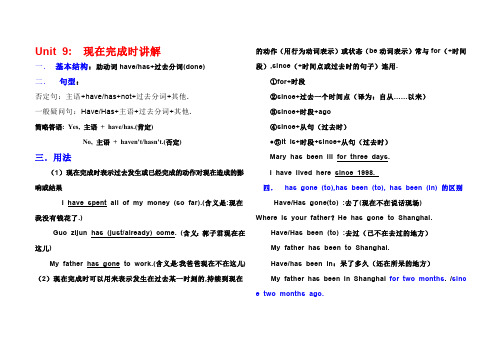
Unit 9: 现在完成时讲解一.基本结构:助动词have/has+过去分词(done)二. 句型:否定句:主语+have/has+not+过去分词+其他.一般疑问句:Have/Has+主语+过去分词+其他.简略答语: Yes, 主语+ have/has.(肯定) No, 主语+ haven't/hasn't.(否定)三.用法(1)现在完成时表示过去发生或已经完成的动作对现在造成的影响或结果 I have spent all of my money (so far).(含义是:现在我没有钱花了.) Guo zijun has (just/already) come. (含义:郭子君现在在这儿)My father has gone to work.(含义是:我爸爸现在不在这儿) (2)现在完成时可以用来表示发生在过去某一时刻的,持续到现在的动作(用行为动词表示)或状态(be动词表示)常与for(+时间段),since(+时间点或过去时的句子)连用. ①for+时段 ②since+过去一个时间点(译为:自从……以来) ③since+时段+ago ④since+从句(过去时) ●⑤It is+时段+since+从句(过去时) Mary has been ill for three days. I have lived here since 1998. 四. has gone (to),has been (to), has been (in) 的区别 Have/Has gone(to) :去了(现在不在说话现场)Where is your father?He has gone to Shanghai.Have/Has been (to) :去过(已不在去过的地方)My father has been to Shanghai.Have/has been in:呆了多久(还在所呆的地方)My father has been in Shanghai for two months. /sinc e two months ago.五.现在完成时的标志 1. 现在完成时的含义之一是过去完成的动作对现在仍有影响,用以下四大标志词可以表达这种含义: * 以already, just和yet为标志 He has already got her help. 他已得到她的帮助。
最新高一必备英语现在完成时技巧全解及练习题(含答案)

最新高一必备英语现在完成时技巧全解及练习题(含答案)一、单项选择现在完成时1.We two thirds of the project so far and we’re sure to complete it on time.A.finish B.will finishC.have finished D.finished【答案】C【解析】【详解】考查时态。
句意:到目前为止,我们已经完成了三分之二的项目,我们一定会按时完成。
根据句中时间状语so far可知用现在完成时。
故选C。
【点睛】本题考查现在完成时,现在完成时是“过去的动作或状态持续到现在并且已经完成”。
判断现在完成时的标志词有already , ever , never , yet , just , before, still , lately ,since , for a long time ,up to now, until, so far, in the last few years/weeks/mouths , till now, recently等,考生在平时学习英语过程中要多注意积累。
本题只要抓住句中时间状语so far(到目前为止)就可以判断出用现在完成时。
2.He is the only one of the students who _____ a winner of scholarship five times up to now. A.is B.areC.have been D.has been【答案】D【解析】【详解】考查现在完成时和主谓一致。
句意:他是唯一一位三年奖学金获得者的学生。
句中的先行词为the only one,在定语从句中作主语,故谓语动词用单数。
根据句中的时间状语for three years,故时态用现在完成时。
故D正确。
3.Throughout the history of movie-making, Shakespeare’s plays for films more than the works of any other writer.A.were being adapted B.would be adaptedC.have been adapted D.are adapted【答案】C【解析】【详解】考查现在完成时的被动语态。
高中现在完成时讲解与练习.docx
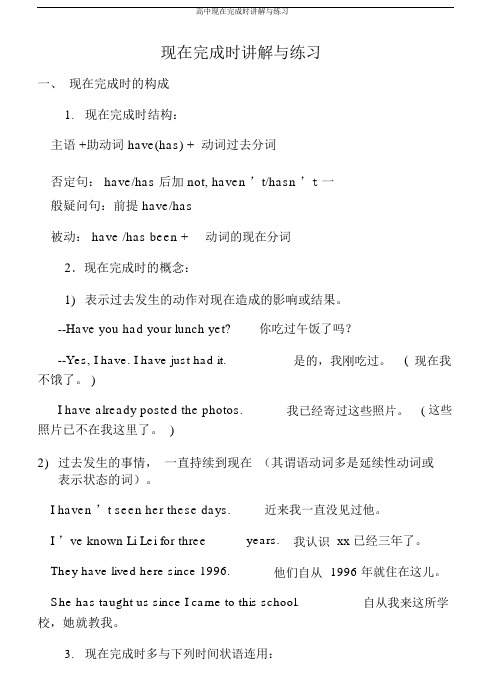
高中现在完成时讲解与练习现在完成时讲解与练习一、现在完成时的构成1.现在完成时结构:主语 +助动词 have(has) + 动词过去分词否定句: have/has 后加 not, haven ’t/hasn ’t一般疑问句:前提 have/has被动: have /has been +动词的现在分词2.现在完成时的概念:1)表示过去发生的动作对现在造成的影响或结果。
--Have you had your lunch yet?你吃过午饭了吗?--Yes, I have. I have just had it.是的,我刚吃过。
(现在我不饿了。
)I have already posted the photos.我已经寄过这些照片。
( 这些照片已不在我这里了。
)2)过去发生的事情,一直持续到现在(其谓语动词多是延续性动词或表示状态的词)。
I haven ’t seen her these days.近来我一直没见过他。
I ’ve known Li Lei for three years.我认识xx 已经三年了。
They have lived here since 1996.他们自从1996 年就住在这儿。
She has taught us since I came to this school.自从我来这所学校,她就教我。
3.现在完成时多与下列时间状语连用:高中现在完成时讲解与练习1)用于“过去发生的事,对现在造成的影响或结果”的时间状语有:already( 已经→肯定句 ) yet(还;尚未→否/疑问句)-Has he phoned you yet?---No,not yet.never(从未 )ever(曾经→疑问句 )Have you ever talked to him about it ?just( 刚刚 )before(以前)already 用于肯定句,可放在助动词之后、过去分词之前,也可放在句末;yet 用在疑问句中意为“已经”,用在否定句中表示“还”,常放在句末;ever 意为“曾经”,用于疑问句或否定句中,放在助动词与过去分词之间;never 意为“从来都没有”, xxbefore 连用,多放在助动词与过去分词之间。
高中现在完成时讲解与练习(非常详细)(精编文档).doc
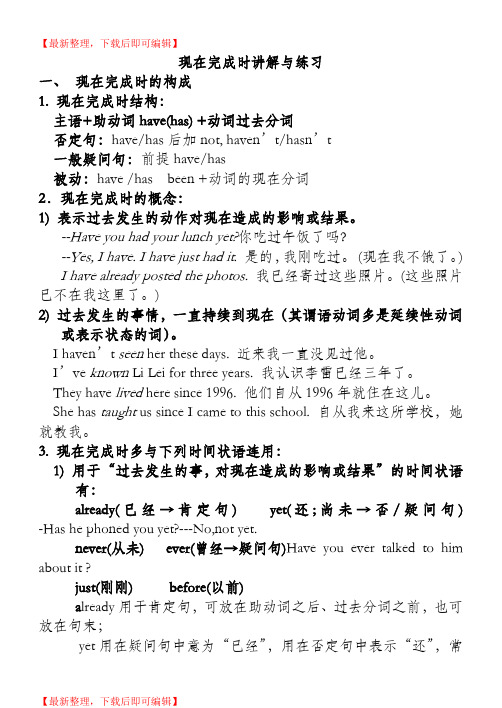
【最新整理,下载后即可编辑】现在完成时讲解与练习一、现在完成时的构成1. 现在完成时结构:主语+助动词have(has) +动词过去分词否定句:have/has后加not, haven’t/hasn’t一般疑问句:前提have/has被动:have /has been +动词的现在分词2.现在完成时的概念:1) 表示过去发生的动作对现在造成的影响或结果。
--Have you had your lunch yet?你吃过午饭了吗?--Yes, I have. I have just had it. 是的,我刚吃过。
(现在我不饿了。
)I have already posted the photos. 我已经寄过这些照片。
(这些照片已不在我这里了。
)2) 过去发生的事情,一直持续到现在(其谓语动词多是延续性动词或表示状态的词)。
I haven’t seen her these days. 近来我一直没见过他。
I’ve known Li Lei for three years. 我认识李雷已经三年了。
They have lived here since 1996. 他们自从1996年就住在这儿。
She has taught us since I came to this school. 自从我来这所学校,她就教我。
3. 现在完成时多与下列时间状语连用:1) 用于“过去发生的事,对现在造成的影响或结果”的时间状语有:already(已经→肯定句) yet(还;尚未→否/疑问句) -Has he phoned you yet?---No,not yet.never(从未) ever(曾经→疑问句)Have you ever talked to him about it ?just(刚刚) before(以前)a lready 用于肯定句,可放在助动词之后、过去分词之前,也可放在句末;yet用在疑问句中意为“已经”,用在否定句中表示“还”,常放在句末;ever意为“曾经”,用于疑问句或否定句中,放在助动词与过去分词之间;never意为“从来都没有”,常和before连用,多放在助动词与过去分词之间。
(英语)高一英语现在完成时解题技巧讲解及练习题(含答案)及解析
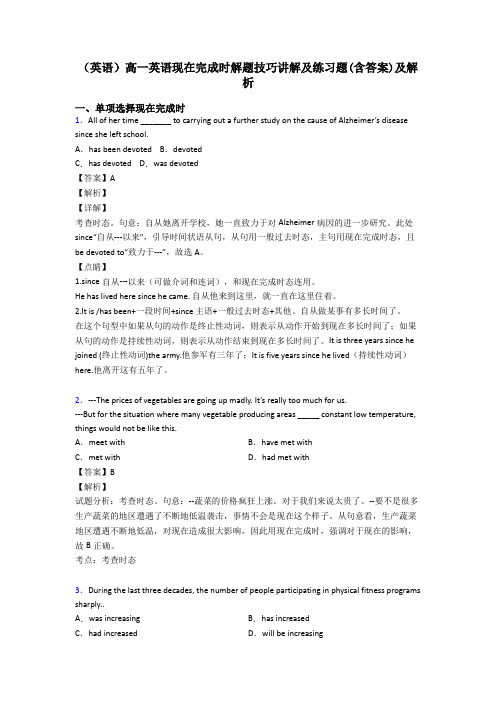
(英语)高一英语现在完成时解题技巧讲解及练习题(含答案)及解析一、单项选择现在完成时1.All of her time _______ to carrying out a further study on the cause of Alzheimer’s disease since she left school.A.has been devoted B.devotedC.has devoted D.was devoted【答案】A【解析】【详解】考查时态。
句意:自从她离开学校,她一直致力于对Alzheimer病因的进一步研究。
此处since“自从---以来”,引导时间状语从句,从句用一般过去时态,主句用现在完成时态,且be devoted to“致力于---”,故选A。
【点睛】1.since自从---以来(可做介词和连词),和现在完成时态连用。
He has lived here since he came. 自从他来到这里,就一直在这里住着。
2.It is /has been+一段时间+since 主语+一般过去时态+其他。
自从做某事有多长时间了。
在这个句型中如果从句的动作是终止性动词,则表示从动作开始到现在多长时间了;如果从句的动作是持续性动词,则表示从动作结束到现在多长时间了。
It is three years since he joined (终止性动词)the army.他参军有三年了;It is five years since he lived(持续性动词)here.他离开这有五年了。
2.---The prices of vegetables are going up madly. It’s really too much for us.---But for the situation where many vegetable producing areas _____ constant low temperature, things would not be like this.A.meet with B.have met withC.met with D.had met with【答案】B【解析】试题分析:考查时态。
现在完成时态讲解及练习

现在完成时态讲解及练习一、现在完成时的构成肯定句:主语+have/ has + done (过去分词)+其它He has lived in Shenzhen for 4 years.一般疑问句:Have/ Has +主语+ done (过去分词)+其它Has he lived in Shenzhen for 4 years?否定句: 主语+have/ has+ not + done (过去分词)+其它He has not finished his homework.过去分词的构成方法如下 :1.一般情况下,直接在动词原形后面加 –ed.work---worked answer---answered obey---obeyed want---wanted 2.以不发音的 -e 结尾的动词只加 –d.Move---moved hope---hoped divide---divided 3.字尾是辅音+y 的动词。
则将y 改i 加ed. study---studied tidy---tidied satisfy---satisfied4.以重读闭音节结尾的词,这些词的末尾只有一个辅音字母时,双写这个辅音字母,再加 –ed. stop---stopped regret--- regretted drop---dropped不规则动词过去式与过去分词分类记忆表一、AAA. (原形,过去式和过去分词一致)二、ABB (过去式和过去分词一致)3) 过去式、过去分词-t 替换原形-d6) 过去式、过去分词改为-elt二、现在完成时标志词:recently; recent years; these days/ years; lately; since; for+时间段;in the past few years; ever since; in the last five months; up to now; since then; so far; ever; never, yet; once; twice; already; before; just already (已经): 用于肯定句I have already posted the letter .yet(已经): 用于否定句,疑问句He hasn’t done his homework yet.just(刚刚)They have just left.ever(曾经)Have you ever been to Beijing ?never(从不)I have never seen him .before(以前)Have you seen the film before?since(自从…以来)I’ve worked in the school since 1999.for(长达)He’s lived in Shenzhen for 6 years.in the past several days / weeks/ years(在过去的…)recently(最近)I have not written to my parents recently.so far(到目前为止)So far she has learned 5 English songs.up to now(到目前为止)this morning/month/year(今天早上/这个月/今年)三、现在完成时的用法1)现在完成时表示过去发生的动作,并对现在有影响。
(英语)高中必备英语现在完成时技巧全解及练习题(含答案)
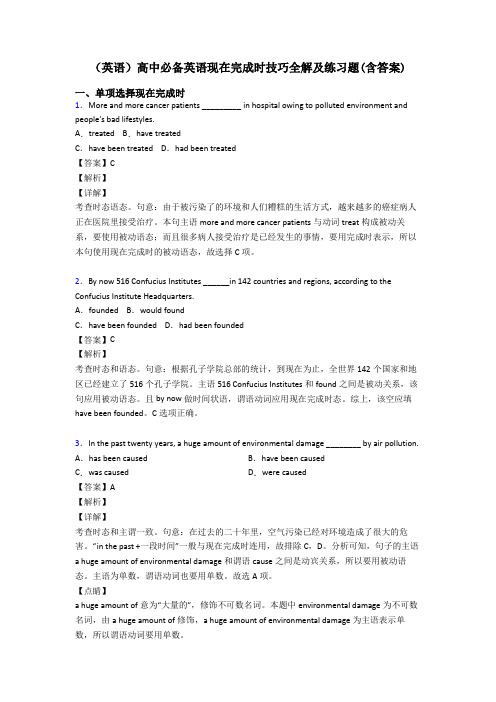
(英语)高中必备英语现在完成时技巧全解及练习题(含答案)一、单项选择现在完成时1.More and more cancer patients _________ in hospital owing to polluted environment and people’s bad lifestyles.A.treated B.have treatedC.have been treated D.had been treated【答案】C【解析】【详解】考查时态语态。
句意:由于被污染了的环境和人们糟糕的生活方式,越来越多的癌症病人正在医院里接受治疗。
本句主语more and more cancer patients与动词treat构成被动关系,要使用被动语态;而且很多病人接受治疗是已经发生的事情,要用完成时表示,所以本句使用现在完成时的被动语态,故选择C项。
2.By now 516 Confucius Institutes ______in 142 countries and regions, according to the Confucius Institute Headquarters.A.founded B.would foundC.have been founded D.had been founded【答案】C【解析】考查时态和语态。
句意:根据孔子学院总部的统计,到现在为止,全世界142个国家和地区已经建立了516个孔子学院。
主语516 Confucius Institutes和found之间是被动关系,该句应用被动语态。
且by now做时间状语,谓语动词应用现在完成时态。
综上,该空应填have been founded。
C选项正确。
3.In the past twenty years, a huge amount of environmental damage ________ by air pollution. A.has been caused B.have been causedC.was caused D.were caused【答案】A【解析】【详解】考查时态和主谓一致。
(word版)现在完成时与现在完成进行时态讲解及练习(含答案),文档
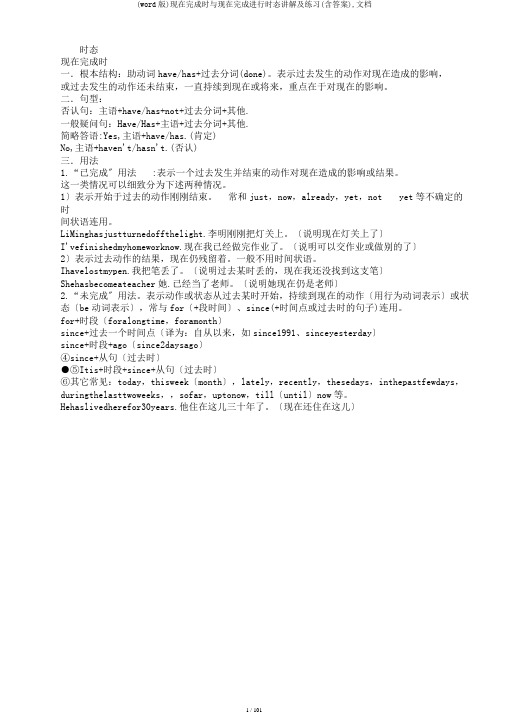
时态现在完成时一.根本结构:助动词have/has+过去分词(done)。
表示过去发生的动作对现在造成的影响,或过去发生的动作还未结束,一直持续到现在或将来,重点在于对现在的影响。
二.句型:否认句:主语+have/has+not+过去分词+其他.一般疑问句:Have/Has+主语+过去分词+其他.简略答语:Yes,主语+have/has.(肯定)No,主语+haven't/hasn't.(否认)三.用法1.“已完成〞用法:表示一个过去发生并结束的动作对现在造成的影响或结果。
这一类情况可以细致分为下述两种情况。
1〕表示开始于过去的动作刚刚结束。
常和just,now,already,yet,not yet等不确定的时间状语连用。
LiMinghasjustturnedoffthelight.李明刚刚把灯关上。
〔说明现在灯关上了〕I'vefinishedmyhomeworknow.现在我已经做完作业了。
〔说明可以交作业或做别的了〕2〕表示过去动作的结果,现在仍残留着。
一般不用时间状语。
Ihavelostmypen.我把笔丢了。
〔说明过去某时丢的,现在我还没找到这支笔〕Shehasbecomeateacher她.已经当了老师。
〔说明她现在仍是老师〕2.“未完成〞用法。
表示动作或状态从过去某时开始,持续到现在的动作〔用行为动词表示〕或状态〔be动词表示〕,常与for〔+段时间〕、since(+时间点或过去时的句子)连用。
for+时段〔foralongtime,foramonth〕since+过去一个时间点〔译为:自从以来,如since1991、sinceyesterday〕since+时段+ago〔since2daysago〕④since+从句〔过去时〕●⑤Itis+时段+since+从句〔过去时〕⑥其它常见:today,thisweek〔month〕,lately,recently,thesedays,inthepastfewdays,duringthelasttwoweeks,,sofar,uptonow,till〔until〕now等。
(word完整版)高中现在完成时及其练习

(word完整版)⾼中现在完成时及其练习表格式现在完成时的时态和语态温馨提⽰:过去分词规则的和⼀般过去时态的动词变化规则⼀样,动词结尾+ed。
不规则的要逐个记忆不规则:go-went(过去式)---gone(过去分词)如规则的: play---played(过去式)--played(过去分词)The countryside has changed a lot in the past few years.is\am fly beginare play godrink work makepass does danceworry ask tasteeat draw put⼀、详解现在完成时的常见的标志语和词组,特殊结构的⽤法1. 九个重点标志语的⽤法①already已经肯定句中或句尾I have already found my pen. = I have found my pen already.②yet已经否定句和疑问句句尾I have not finished the work yet.Have you bought a computer yet?③ever曾经句中Have you ever seen pandas?④never从不句中I have never been to Beijing.⑤just刚刚句中I have just done my work.⑥before以前句尾I have never been there before.⑦so far到⽬前为⽌So far he has learnt 200 words.⑧how long多久How long have you lived here?⑨how many times多少次How many times has he been to Beijing?2、三词组⽤法区别:(1)havegone to“去了某地” ,主语不在说话现场,通过“Where is Tom”,或者“My father isn’t in/at home.”来体现。
高中英语语法现在完成时讲解与练习4(有答案)

现在完成时讲解与练习一、现在完成时的构成1. 现在完成时结构:主语+助动词have(has) +动词过去分词否定句:have/has后加not, haven’t/hasn’t一般疑问句:前提have/has2.现在完成时的概念:1) 表示过去发生的动作对现在造成的影响或结果。
--Have you had your lunch yet?你吃过午饭了吗?--Yes, I have. I have just had it. 是的,我刚吃过。
(现在我不饿了。
)I have already posted the photos. 我已经寄过这些照片。
(这些照片已不在我这里了。
)2) 过去发生的事情,一直持续到现在(其谓语动词多是延续性动词或表示状态的词)。
I haven’t seen her these days. 近来我一直没见过他。
I’ve known Li Lei for three years. 我认识李雷已经三年了。
They have lived here since 1996. 他们自从1996年就住在这儿。
She has taught us since I came to this school. 自从我来这所学校,她就教我。
3. 现在完成时多与下列时间状语连用:1) 用于“过去发生的事,对现在造成的影响或结果”的时间状语有:already(已经→肯定句) yet(还;尚未→否/疑问句)never(从未) ever(曾经→疑问句)just(刚刚) before(以前)2) 用于“过去发生的事,一直延续到现在”的时间状语有:for + 时间段(for two years)since two years agosince + 时间点since 2008since he came here.so far(目前;迄今为止) up to now=till now=by now到现在为止;直到现在by the end of this year 到今年年末【by the end of…到…末/结束】by the end of this month到本月末during the last (past) few years 在过去的几年中in the last (past) months 在过去的几个月中all the time 总是;一直recently 最近these days 近几天3. have(has) been 和have(has) gone 区分1) have/ has gone (to) 表示某人已经去了某地,人不在这儿。
(完整版)现在完成时讲解(含讲解及习题)(可编辑修改word版)

现在完成时讲解一、构成:肯定式:主语+ 助动词have/has + 动词的过去分词.疑问式:助动词Have/Has + 主语+ 动词的过去分词?否定式: 主语+ 助动词have/has + not + 动词的过去分词.过去分词规则变化:a)一般情况下,直接加ed, (work---worked,water---watered, finish---finished 等;)b)以“辅音字母+ y”结尾的动词, 把y 变成i 再加ed, (carry-- -carried study---studied 等;)c)以辅+元+辅结尾且中读的动词,要双写最后一个辅音字母,再加ed。
(stop---stopped,shop---shopped)d)以不发音的e 结尾的动词,只加d(过去分词不规则变化表:二、用法:用法一:表示过去(已经、曾经或从未)发生的某一动作对现在造成的影响或结果。
标志词:①already, ②never, ③ever, ④just, ⑤yet, ⑥before,⑦once/twice/数字+ times例:I have cleaned my room. 我已打扫了房间(房间现在是干净的,不需要打扫了)They have left. --他们已经离开了,也就是说现在他们人不在这里I have never had a car (我从未有过汽车。
)I have been there twice.a)already 往往用于肯定句,用在疑问句时表示强调或加强语气;yet 用于否定句和疑问句。
•He has already left here. 他已经离开这里了。
•Has he already left here? 他(真的)已经离开这里了吗?(表示加强语气)•My teachers haven’t had breakfast yet. 我的老师们还没有吃早饭。
•Have you written to your parents yet? 你已经给你父母写过信了吗?b)never 是否定词,表示“从来没有”,而ever 表示“曾经”•We have never been to the Great Wall. 我们从来没有去过长城。
现在完成时态的讲解和练习题(6月5日)
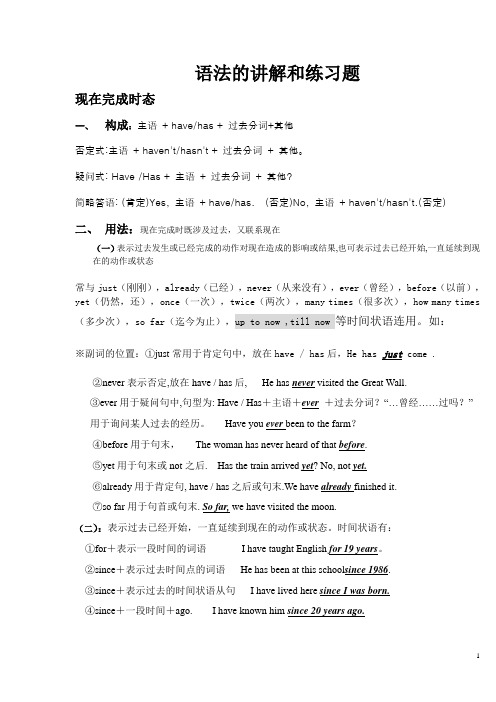
语法的讲解和练习题现在完成时态一、构成:主语+ have/has + 过去分词+其他否定式:主语+ haven't/hasn't + 过去分词+ 其他。
疑问式: Have /Has + 主语+ 过去分词+ 其他?简略答语: (肯定)Yes, 主语+ have/has. (否定)No, 主语+ haven't/hasn't.(否定)二、用法:现在完成时既涉及过去,又联系现在(一)表示过去发生或已经完成的动作对现在造成的影响或结果,也可表示过去已经开始,一直延续到现在的动作或状态常与just(刚刚),already(已经),never(从来没有),ever(曾经),before(以前),yet(仍然,还),once(一次),twice(两次),many times(很多次),how many times(多少次),so far(迄今为止),up to now ,till now 等时间状语连用。
如:※副词的位置:①just常用于肯定句中,放在have / has后,He has just come .②never表示否定,放在have / has后, He has never visited the Great Wall.③ever用于疑问句中,句型为: Have / Has+主语+ever+过去分词?“…曾经……过吗?”用于询问某人过去的经历。
Have you ever been to the farm?④before用于句末,The woman has never heard of that before.⑤yet用于句末或not之后. Has the train arrived yet? No, not yet.⑥already用于肯定句, have / has之后或句末.We have already finished it.⑦so far用于句首或句末. So far, we have visited the moon.(二):表示过去已经开始,一直延续到现在的动作或状态。
现在完成时讲解及练习(精编文档).doc
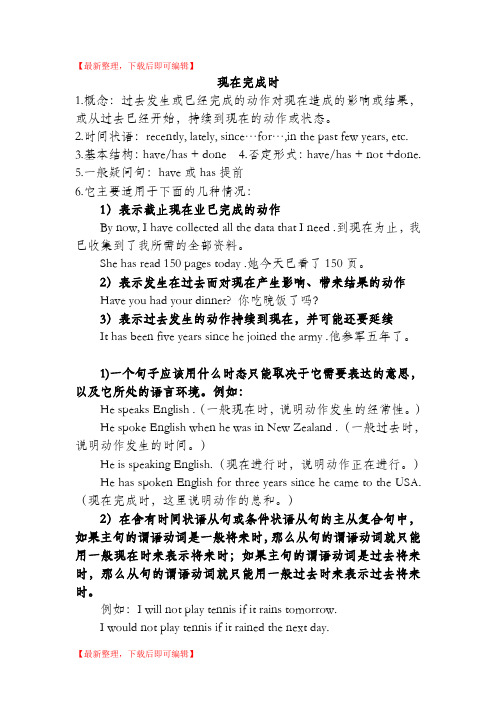
【最新整理,下载后即可编辑】现在完成时1.概念:过去发生或已经完成的动作对现在造成的影响或结果,或从过去已经开始,持续到现在的动作或状态。
2.时间状语:recently, lately, since…for…,in the past few years, etc.3.基本结构:have/has + done4.否定形式:have/has + not +done.5.一般疑问句:have或has提前6.它主要适用于下面的几种情况:1)表示截止现在业已完成的动作By now, I have collected all the data that I need .到现在为止,我已收集到了我所需的全部资料。
She has read 150 pages today .她今天已看了150页。
2)表示发生在过去而对现在产生影响、带来结果的动作Have you had your dinner? 你吃晚饭了吗?3)表示过去发生的动作持续到现在,并可能还要延续It has been five years since he joined the army .他参军五年了。
1)一个句子应该用什么时态只能取决于它需要表达的意思,以及它所处的语言环境。
例如:He speaks English .(一般现在时,说明动作发生的经常性。
)He spoke English when he was in New Zealand .(一般过去时,说明动作发生的时间。
)He is speaking English.(现在进行时,说明动作正在进行。
)He has spoken English for three years since he came to the USA.(现在完成时,这里说明动作的总和。
)2)在含有时间状语从句或条件状语从句的主从复合句中,如果主句的谓语动词是一般将来时,那么从句的谓语动词就只能用一般现在时来表示将来时;如果主句的谓语动词是过去将来时,那么从句的谓语动词就只能用一般过去时来表示过去将来时。
现在完成时详细讲解及练习

A. were B. have been C. have become D. have made
例三.—How long have you _A___ here ?
—About two months .
A. been B. gone C. come
D. arrived
例四. Hurry up, The play ____C______ for ten minutes .
catch a cold—→ have a cold等,
翻 译 练 习:
一.我买了这块手表五年了.
I have bought this watch for five years.W
I have had this watch for five years/since 五 years ago.
二.这位老人已经死了十年了.
二. since +[表示过去某一时间的]时间点
从句[一般过去时]
Eg. I have been here since 二000. I have been here since 五 years ago. I have been here since I left school in 二
000.
*It is +一段时间 +since+句子[一般过去时间] =一段时间+has passed+since + 句子[一般过去时]
[二]现在完成时还与once[一次],twice[两 次],three times[三次],several times[几次]等表 示重复次数的词语连用.
考点三:考查与一般过去时的区别
例一.—These farmers have been to the United States .
现在完成时精讲及习题答案
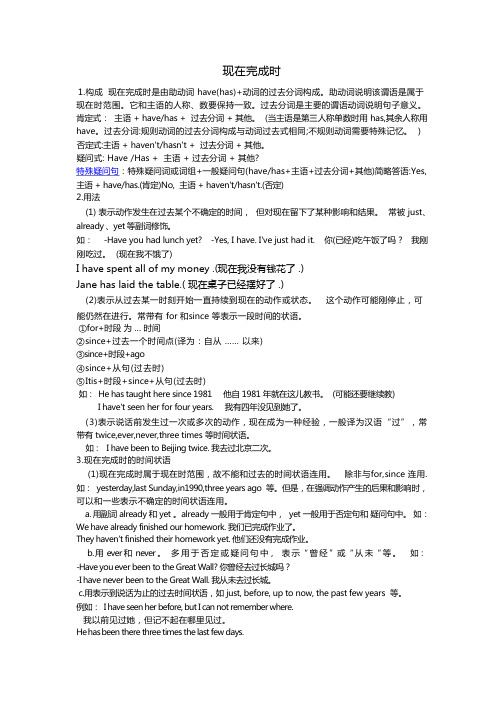
现在完成时1.构成现在完成时是由助动词 have(has)+动词的过去分词构成。
助动词说明该谓语是属于现在时范围。
它和主语的人称、数要保持一致。
过去分词是主要的谓语动词说明句子意义。
肯定式:主语 + have/has + 过去分词 + 其他。
(当主语是第三人称单数时用 has,其余人称用have。
过去分词:规则动词的过去分词构成与动词过去式相同;不规则动词需要特殊记忆。
) 否定式:主语 + haven't/hasn't + 过去分词 + 其他。
疑问式: Have /Has + 主语 + 过去分词 + 其他?特殊疑问句:特殊疑问词或词组+一般疑问句(have/has+主语+过去分词+其他)简略答语:Yes, 主语 + have/has.(肯定)No, 主语 + haven't/hasn't.(否定)2.用法(1) 表示动作发生在过去某个不确定的时间,但对现在留下了某种影响和结果。
常被 just、already 、yet 等副词修饰。
如: -Have you had lunch yet? -Yes, I have. I've just had it. 你(已经)吃午饭了吗?我刚刚吃过。
(现在我不饿了)I have spent all of my money .(现在我没有钱花了 .)Jane has laid the table.( 现在桌子已经摆好了 .)(2)表示从过去某一时刻开始一直持续到现在的动作或状态。
这个动作可能刚停止,可能仍然在进行。
常带有 for 和since 等表示一段时间的状语。
①for+时段为… 时间②since+过去一个时间点(译为:自从…… 以来)③since+时段+ago④since+从句(过去时)⑤Itis+时段+since+从句(过去时)如: He has taught here since 1981 他自 1981 年就在这儿教书。
现在完成时讲解及练习题及答案
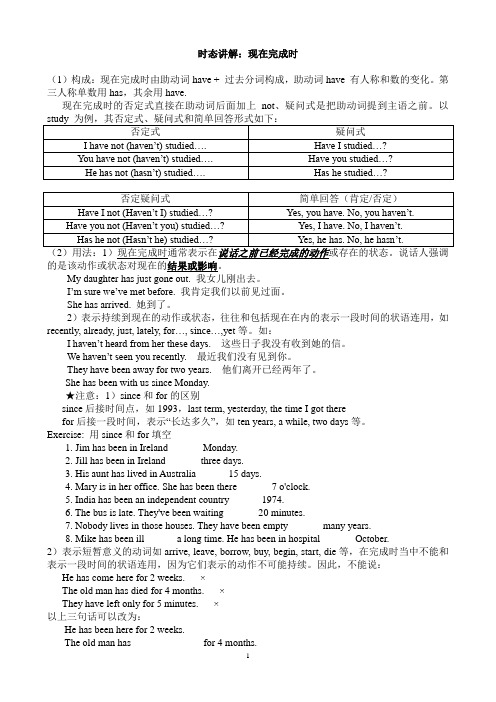
时态讲解:现在完成时(1)构成:现在完成时由助动词have + 过去分词构成,助动词have 有人称和数的变化。
第三人称单数用has,其余用have.现在完成时的否定式直接在助动词后面加上not、疑问式是把助动词提到主语之前。
以)现在完成时通常表示在说话之前已经完成的动作或存在的状态。
说话人强调的是该动作或状态对现在的结果或影响。
My daughter has just gone out. 我女儿刚出去。
I’m sure we’ve met before. 我肯定我们以前见过面。
She has arrived. 她到了。
2)表示持续到现在的动作或状态,往往和包括现在在内的表示一段时间的状语连用,如recently, already, just, lately, for…, since…,yet等。
如:I haven’t heard from her these days. 这些日子我没有收到她的信。
We haven’t seen you recently. 最近我们没有见到你。
They have been away for two years. 他们离开已经两年了。
She has been with us since Monday.★注意:1)since和for的区别since后接时间点,如1993,last term, yesterday, the time I got therefor后接一段时间,表示“长达多久”,如ten years, a while, two days等。
Exercise: 用since和for填空1. Jim has been in Ireland ______ Monday.2. Jill has been in Ireland ______ three days.3. His aunt has lived in Australia ______15 days.4. Mary is in her office. She has been there ______ 7 o'clock.5. India has been an independent country ______1974.6. The bus is late. They've been waiting ______ 20 minutes.7. Nobody lives in those houses. They have been empty ______ many years.8. Mike has been ill ______a long time. He has been in hospital ______ October.2)表示短暂意义的动词如arrive, leave, borrow, buy, begin, start, die等,在完成时当中不能和表示一段时间的状语连用,因为它们表示的动作不可能持续。
- 1、下载文档前请自行甄别文档内容的完整性,平台不提供额外的编辑、内容补充、找答案等附加服务。
- 2、"仅部分预览"的文档,不可在线预览部分如存在完整性等问题,可反馈申请退款(可完整预览的文档不适用该条件!)。
- 3、如文档侵犯您的权益,请联系客服反馈,我们会尽快为您处理(人工客服工作时间:9:00-18:30)。
现在完成时讲解与练习一、现在完成时的构成1.现在完成时结构:主语 +助动词 have(has) +动词过去分词否定句: have/has 后加 not, haven ’t/hasn ’t一般疑问句:前提have/has被动: have /has been +动词的现在分词2.现在完成时的概念:1)表示过去发生的动作对现在造成的影响或结果。
--Have you had your lunch yet 你吃过午饭了吗--Yes, I have. I have just had it. 是的,我刚吃过。
(现在我不饿了。
)I have already posted the photos. 我已经寄过这些照片。
(这些照片已不在我这里了。
)2) 过去发生的事情,一直持续到现在(其谓语动词多是延续性动词或表示状态的词)。
I haven seent’ her these days. 近来我一直没见过他。
I ’ veknown Li Lei for three years. 我认识李雷已经三年了。
They have lived here since 1996. 他们自从 1996 年就住在这儿。
She has taught us since I came to this school. 自从我来这所学校,她就教我。
3. 现在完成时多与下列时间状语连用:1)用于“过去发生的事,对现在造成的影响或结果”的时间状语有:already( 已经→肯定) yet(还 ;尚未→否 / 疑问句 ) -Hashephonedyouyet---No,notyet.句never( 从未 ) ever( 曾经→疑问)Have you ever talked to him about it句just( 刚刚 ) before( 以前 )already 用于肯定句,可放在助动词之后、过去分词之前,也可放在句末;yet 用在疑问句中意为“已经”,用在否定句中表示“还”,常放在句末;ever 意为“曾经” ,用于疑问句或否定句中,放在助动词与过去分词之间;never意为“从来都没有”,常和before连用,多放在助动词与过去分词之间。
havenevertraveledbyplanebefore.before 意为“以前”,指过去不确定的某个时间,总是放在句末,不受句型的限制。
haven’theardofitbefore.2)用于“过去发生的事,一直延续到现在”的时间状语有:for + 时间段 (for two years)since two years agosince + 时间点since 2008Since thensince he came here.so far(目前 ;迄今为止 )up to now=till now=by now到现在为止;直到现在all the time总是;一直recently lately最近these days近几天【 by the end of到末/结束】by the end of this year到今年年末by the end of this month到本月末during /over the last (past) few years在过去的几年中in the last /past months在过去的几个月中in the past/last few days/years在过去的这几天3) This/It is the first/second time + that从句that 从句要用现在完成时This is the first time that I have come here.4)在条件,时间,让步状语从句中,表示将来某时以前已完成的动作I will not believe you unless I have seen it with my own eyes. I will gowith you as soon as I have finished my work.3.have(has) been 和 have(has) gone 区分1)have/ has gone (to) 表示某人已经去了某地,人不在这儿。
--Where is Jim – He has gone to London. (人不在这儿,已去了London)2)have/ has been (to) 表示曾经到过某地,但现在人已回来。
I have been to Shanghai twice.我到过上海两次。
(以前去的上海,现在人已回来)--Where have you been, Jim吉姆,你去了哪里--I have been to the library.我去了图书馆。
后面还可以跟不定式I’ vebeentoseemygrandmother.( 现已回来) She’ sbeentodosomeshopping.3) have/has been in + 地点(adv. 去to) 在某处呆过多长时间(现在还在那里)How long have you been here/there I have been here/there for 10 years.)你在这里多长时间了我在这里10 年了。
(现在还在Dashan has been in China since 20years ago.大山自从20 年前就在中国。
(现在还在)How long have been at this school I have been here for over two years.(现在还在你在这所学校多长时间了我在这里两年多了。
)got 的特殊用法:havegot 在形式上时现在完成时,在意思上和have 相同:Haveyougot(=Doyouhave)atimetableShehasn ’’ vegotanotherthreeminutes.gotto 和 haveto 意思相同: havegotto 和 haveto 意思相同: havegotto=haveto, 表示“不得不” :You’’ swhatwe ’’ vegottokeepthisinmind.在口语中, have 有时可以省略。
Wegottomakeendsmeet. 我们得收支相抵。
二、现在完成时和一般过去时的区别现在完成时表示过去发生的某一动作对现在造成的影响或结果,强调的是现在的情况,所以它不能与表示过去的时间状语连用。
如: yesterday, last night, three weeks ago, in 2004等。
而一般过去时只表示过去的动作或状态,和现在没有任何关系,它可以和表示过去的时间状语连用。
I have seen the film. 我看过这部电影。
(我了解这部电影的内容。
)I saw the film last week. 我上星期看了这部电影.(只说明上星期看了这部电影,不涉及现在的情)况He has lived here since 1992. 1992 年以来他一直住在这里。
(他现在还住在这里)He lived here in 1992. 1992 年他住在这里。
(不涉及现在他是否还住在这里)把下列句子分别变成否定句、一般疑问句并作回答。
1) I have already cleaned the room.否定句 :____________________________________________________________一般疑问句:_________________________________________________________肯定回答: ________________________否定回答:_________________________2) Jim has never been to Harbin.一般疑问句:________________________________________肯定回答: ________________________否定回答:_________________________3)We have lived here since 2 years ago.否定句 :_________________________________________一般疑问句:________________________________________对画线部分提问:_________________________________________________________三、用所给词的适当形式填空1.I _________________________________(learn) 2000 English words so far.2.The old man _______________________________(live) here for 40 years.3.I ________________________________(not see) you for ten years.4._____________________ you ____________________ (sweep) the floor today It is so dirty.5.______________________ he _____________________(spend) all his money Yes, he has.四、短暂性动词与持续性动词在现在完成时中的运用在现在完成时中, 短暂性动词一般不与时间段连用。
即:不与for, since短语或how long问句连用。
非延续性动词与一段时间连用时可采用下述三种方法:a.将非延续性动词转化为延续性动词练习:将下列非延续性动词转化为延续性动词buy ;borrow;open ;close ; begin/start;come;go/leave;finish;died;catchacold;puton;getup;wakeupfallasleep ;lose ;join leavelefthisoffice3hoursago.Hefromhisofficefor3hours.It3hourssincehelefthisoffice..Ithasbeenhedied.b.将时间状语改为过去时间,并用一般过去时代替现在完成时。
用句型“itis+ 一段时间 +since 从句(从句中的谓语动词用非延续性动词的一般过去式)”表示。
如:Itistwoyearssincetheoldmandied. 注意:瞬间动词在完成时态中的否定式可以接一段时间。
